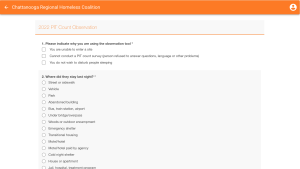Social workers understand that evaluation is an ongoing component of the dynamic and interactive process of social work practice with, and on behalf of, diverse individuals, families, groups, organizations, and communities. Social workers recognize the importance of evaluating processes and outcomes to advance practice, policy, and service delivery effectiveness. Social workers understand theories of human behavior and the social environment, and critically evaluate and apply this knowledge in evaluating outcomes. Social workers understand qualitative and quantitative methods for evaluating outcomes and practice effectiveness.
Social workers:
- Select and use appropriate methods for evaluation of outcomes.
- Apply knowledge of human behavior and the social environment, person-in-environment, and other multidisciplinary theoretical frameworks in the evaluation of outcomes.
- Critically analyze, monitor, and evaluate intervention and program processes and outcomes.
- Apply evaluation findings to improve practice effectiveness at the micro, mezzo, and macro levels.
- Demonstrate evaluation skills to monitor complex systems related to client or community needs in different fields of practice.
Social workers must be able to reflect on their practices to ensure effective outcomes. It is important to record this data to ensure future success with clients. In various agencies, client outcome data is crucial to obtain funding for social services. If a social worker cannot prove that their interventions are effective then the funding will decrease or be eliminated resulting in reducing resources for clients in the surrounding area. I may be challenged by this if I do not receive proper feedback from my clients. Some clients may be prone to give a simple response or not complete a survey. To improve this, I will attempt to keep my clients engaged and ask for feedback throughout my services.
Academic Evidence:
1. In the Engagement tab, I inserted a video recording of me facilitating a psychotherapy group for a course called Social Work Practice with Individuals and Groups. Along that process, I created a termination survey to evaluate how efficient my lesson was and see if my message was received from the clients. This termination survey is short but in the future, I will be making a more thorough survey to get more feedback from clients.
2. Continuing on with the Resilience facilitation, when the group was over I created a case note for the entire session. You can be redirected to it using the link below. This included notes on how the group interacted with me and each other. I was able to note how some clients reacted in a nonverbal way. This evaluation of my lesson allowed me to reflect on what I can improve on to have a more successful group session. Despite it being my first time, I believe I learned how to evaluate the outcomes of my lesson plans for clients. This allows me to continue to reinforce the positive interventions and rule out the negative.
Rock Bottom Resilience: Lesson Plan Evaluation/Case Note
Field Evidence:
At the start of every new year, the Chattanooga Regional Homeless Coalition (CRHC) does a Point-in-Time (PIT) Count of every county they serve. The CRHC serves 11 counties including Hamilton, Sequatchie, Rhea, Polk, Meigs, McMinn, Marion, Grundy, Franklin, Bradley, and Bledsoe. This data collection is done so the Department of Housing and Urban Development (HUD) can evaluate the agency’s outcomes. If data shows that there is a high rate of homelessness in a specific area then HUD will potentially intervene and provide more funding. I had the opportunity to do the PIT count in McMinn and Meigs County. Below you will see the PIT count survey I used to either interview individuals who are homeless or identify homes that are in unlivable condition.

